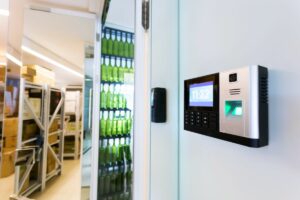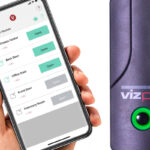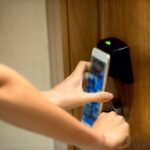Throughout Colorado Springs, you will find various types of access control systems. These systems are constantly monitoring who can access what and when. There are many ways in which an access control system can be implemented and tailored to the needs of a specific organization or business.
Let’s take a look at some of the most common types of access control systems.
Card Access Systems
One of the most common types of access control utilizes cards coded to the system and assigned to a specific user. The system scans the card to determine if the user is authorized to access the program or area in question.
Pros
Card access systems are very versatile for a wide variety of situations. They are affordable, making them an excellent choice for small businesses and organizations in Colorado Springs that want to implement access control but don’t have the budget for a robust system.
Cons
One downside to card access systems is that they can be less secure than other systems. Even newer types of cards that boast greater security (such as RFID) are susceptible to hacking if not kept in a safe place. Additionally, many businesses find that tracking who does and does not have a card is difficult. There is always a risk that an authorized user will let an unauthorized user borrow their card, negating the system’s benefits.
Automated Identification and Authorization System
An automated identification and authorization system (AIDA) tracks who enters and exits a building or area using ID cards or badges.
Pros
AIDA systems are popular in larger organizations, like hospitals or hotels, where controlling access and monitoring who comes and goes is vital to security. These systems are often a smaller part of a more powerful system.
Cons
The main downside to AIDA systems is cost – they are more expensive than other access control systems. They can be challenging to maintain and update, especially when compliance auditors want to examine the system to verify its functionality.
Proximity Card Access Systems

Pros
Like AIDA systems, proximity card systems are popular in larger organizations – like factories or warehouses. They are also relatively inexpensive and easy to maintain.
Cons
One major downside to proximity card systems is that they require line-of-sight to work correctly and may be susceptible to interference. This means the card must be near the reader to unlock the system. Proximity cards are usually part of another, more secure system, like biometric authentication (more on those below).
Smart Card Access Systems
Closely related to proximity cards, smart cards grant access through specific information about the person holding the card. This can include name, job title, and access permissions for specific programs. The system scans and authenticates the card, granting access if everything is correct. These systems are popular in healthcare and academic settings.
Pros
Updating the information on smart cards to reflect promotions, changes in job descriptions, or employee departures, is easy.
Cons
Smart card access control systems often come with a higher price tag than other types of access control, making them more suitable for larger organizations. Additionally, these systems require an expansive infrastructure and regular maintenance to ensure cybersecurity.
Biometric Access Systems
Biometric access systems use fingerprints, hand scans, eye mapping, or other biometric features to grant user access.
Pros
These types of access control systems tend to be very secure, as they only grant access to authorized individuals. Biometric access systems are an excellent choice for healthcare or law enforcement industries, where security is a top priority.
Cons
Biometric access systems can be expensive, making them more suitable for large organizations than small Colorado Springs businesses. Additionally, these systems require a lot of upkeep. Getting them back up and running can be difficult if the system breaks down.
Affordable and Convenient Access Control Through Your SmartPhone
At System Links Colorado, we have experience installing and maintaining all of the above types of access control systems. However, one access control system has caught our eye because of its affordability, security, and convenience. This system relies on the one object most of us keep on our person at all times – our smartphones – to provide access control via Bluetooth technology.
While there are many options for access control, our favorite is the VIZPin access control system. Why?
Convenience
Using your smartphone, you can grant access (and revoke access) to anyone at any time, from anywhere. No more cards, FOBs, or PINs. Your phone does everything via Bluetooth, so no internet connection is necessary.
Security
Because your VIZpin SmartKey app is encrypted and uses Bluetooth, no wi-fi is needed. This means VIZpin access control systems are essentially impossible to hack. And, unlike physical cards or fobs, most people don’t let others borrow their phones, so the chances of users sharing their credentials are significantly reduced.
Affordability
One of the best features of VIZpin is the affordability of the system. Because VIZpin smart keys do not require expensive panels, networks and wiring, the installation and maintenance costs can be much lower than other types of access control systems.
VIZpin may be the access control solution your small Colorado business needs!
Conclusion
These are some of the many different types of access control systems available today. With so many options available, how can you select the right one for your business and budget?
System Links provides Colorado Springs business owners with the peace of mind that they are securing what is essential to operations – their data, employees, and assets. When you schedule your free on-site security evaluation, our experienced installation technicians will assess the needs of your specific business. We will never try to up-sale you an access control system or security camera installation you do not need. And once the installation is complete, we will be there for questions, system maintenance, and repair with our CCTV and access control service agreements.
Contact System Links today to schedule your free on-site security evaluation and quote.




